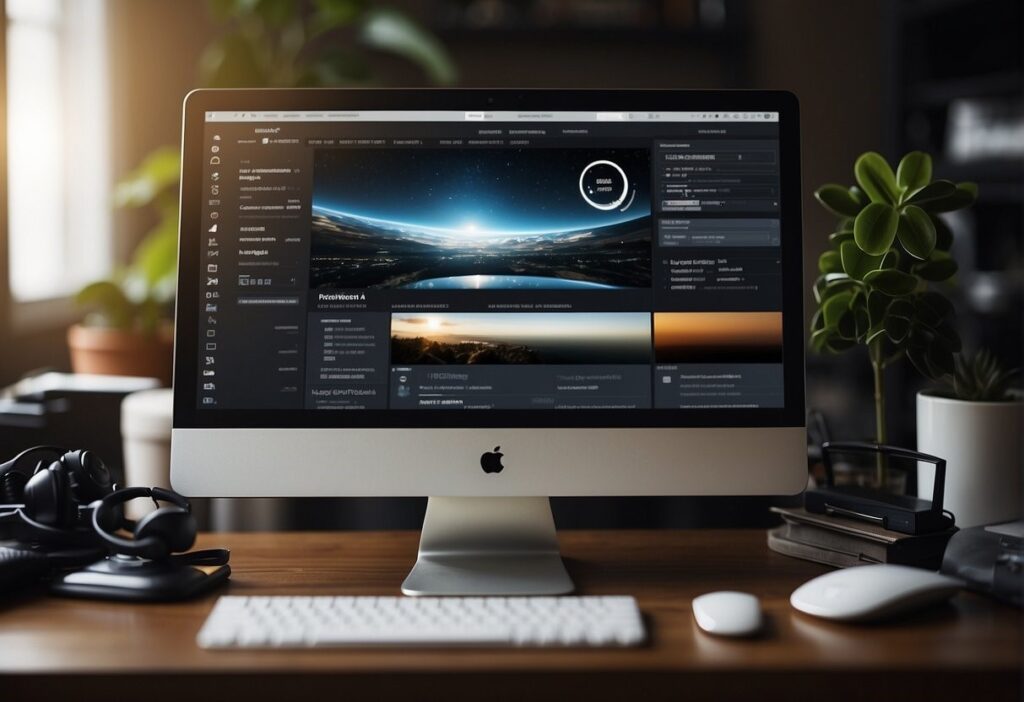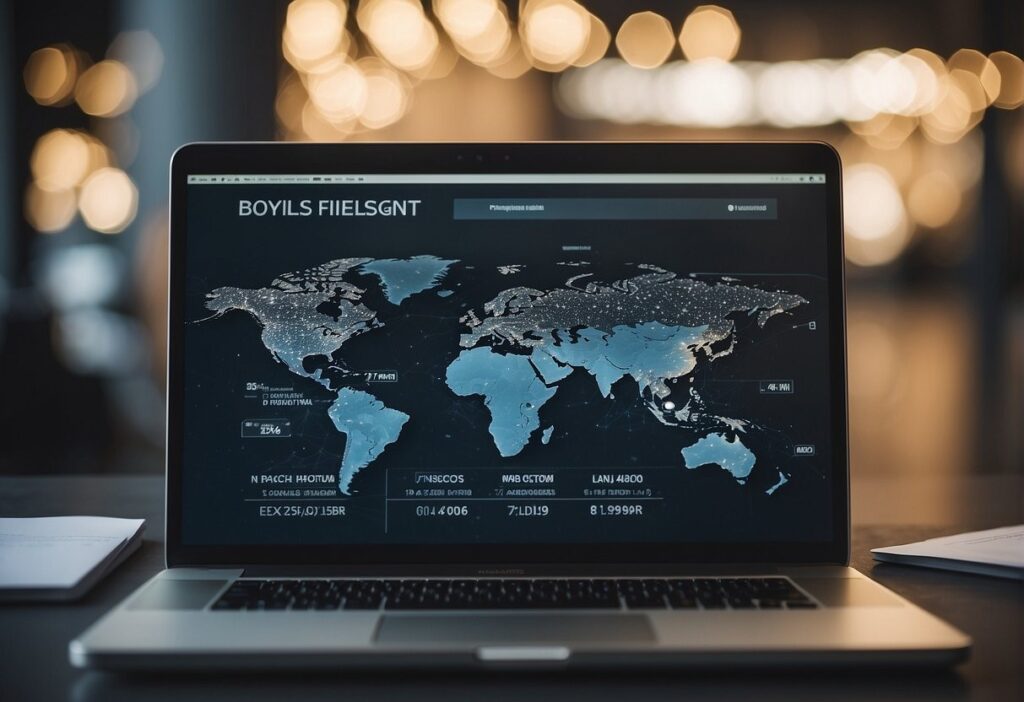When assessing the landscape of web design, a good web design agency stands out for its aesthetic capabilities and its strategic approach to creating functional and user-friendly websites. What truly defines a good web design agency is the ability to harmonize the client’s business goals with the latest web technologies, ensuring that the end product effectively communicates the brand message and captures the target audience. An agency must showcase a deep understanding of user experience (UX) principles and the necessary skills to bring a vision to life on the web.
Selecting the right web design agency involves scrutinizing their portfolio, which should display various styles and industries, indicating versatility and a capacity to tailor to specific client needs. A good agency also fosters transparent communication, creating a collaborative relationship where your input and feedback become a cornerstone of the web design process. Moreover, the agency’s pursuit of measurable results, such as increased engagement and conversion rates, should align with a focus on delivering a satisfactory return on investment. They should articulate how their designs can drive user actions that align with business objectives, ensuring that their work contributes meaningfully to a client’s success online.
Key Takeaways
- A good web design agency aligns design with the client’s business goals and audience needs.
- Portfolio diversity and effective communication are essential elements in agency selection.
- The agency must focus on measurable results, optimizing design for user engagement and ROI.
Defining a Good Web Design Agency

When seeking a web design agency, you should consider their foundational values, industry acumen, and team composition to ensure alignment with your brand.
Core Values and Mission
A successful web design agency aligns its work with clear core values and mission. These guiding principles dictate not only the approach to design but also customer service, project management, and collaboration. You need an agency that resonates with your brand’s ethos and goals, ensuring a compatible and effective partnership.
Industry Expertise
The expertise of a web design agency in your specific industry is critical. An agency with a track record in your field will better understand customer expectations, competition, and compliance requirements. This relevant experience translates to tailored web design solutions that capture the essence of your brand and speak directly to your audience.
Agency Size and Team Composition
The size and makeup of a design agency can significantly impact your project’s outcome. Smaller agencies might offer a more personalized service, while larger ones often possess a broader range of skills and resources. The ideal composition of experts – such as strategists, designers, developers, and project managers – ensures that the agency can handle the complexity of your project and achieve the desired results.
A well-rounded agency should exhibit a balanced team where each member provides specific skills, enhancing overall productivity and creativity in delivering a website that stands out in the digital landscape.
Comprehensive Services Offered

When choosing a web design agency, you’ll want one that provides a suite of services encompassing creative design and technical development. A comprehensive approach ensures your website is aesthetically pleasing, functional, user-friendly, and optimized for search engines.
Creative and Technical Prowess
Your chosen agency should demonstrate a balance of creative and technical skills. They need a team capable of crafting modern and visually striking designs while possessing the technical expertise to implement complex functionalities and ensure a seamless user experience.
Custom Web Design Services
Custom web design services are critical for creating a unique online presence. An agency capable of offering tailor-made solutions ensures that your website reflects your brand’s personality and meets your business needs. A custom website is more than a template; it’s a personalized platform crafted around your objectives.
Search Engine Optimization (SEO)
SEO is essential for making your website visible to search engines. A good web design agency integrates SEO best practices into the design process, ensuring your site is optimized for performance and relevancy. This should include keyword research, meta-tagging, and creating SEO-friendly content that improves your site’s ranking and reach.
Content Strategy and Development
Content is king in the digital marketing world, and an agency that provides a smart content strategy and development service will guide you in conveying your message effectively. They should help you create valuable, compelling content that engages your audience and drives conversions while maintaining your brand voice.
Mobile-Friendly and Responsive Design
With most online traffic from mobile devices, mobile-friendly and responsive design is non-negotiable. Your web design agency should ensure that your site looks and functions perfectly across all devices, providing an optimal user experience regardless of screen size or operating system.
Evaluating Agency Portfolio and Past Work

When selecting a web design agency, you should rigorously assess their portfolio and previous projects to determine their competency and suitability for your needs.
Showcase of Successful Projects
Analyze the portfolio for successful projects that are representative of the agency’s capabilities. Consider the following:
- Award-Winning Design: Look for any mention of industry awards, which signify a high standard of quality and innovation in their work.
- Visual Appeal: Pay attention to using colors, typography, and imagery. Exceptional portfolios feature designs that are not only aesthetically pleasing but also serve the project’s functional needs.
Diversity in Past Clientele
The variety of past clients in an agency’s portfolio can provide insights into their versatility and adaptability:
- Client Industries: A diverse portfolio indicates experience across multiple sectors; this breadth can reflect the agency’s ability to tailor their approach to different audiences.
- Project Types: Look for various projects — from websites to mobile applications. Versatility in project types suggests that the agency can handle the breadth of your design needs.
Understanding Client Relations and Communication

To excel as a web design agency, you must establish robust communication channels and commit to understanding your client’s needs. This approach ensures a smooth delivery of services while enhancing the user experience.
Client Service Approach
As you navigate the project lifecycle, your focus should be on alignment and clarity. Here’s how:
- Establish Clear Objectives: Ensure that you and your client have a common understanding of the project goals from the outset. This alignment sets the stage for success.
- Frequent Check-Ins: Regular updates foster an environment of trust and keep the client informed about the progress.
- Feedback Loops: Create structured opportunities for feedback, which can range from formal reviews to informal conversations.
- Conflict Resolution: Address any misalignments promptly and transparently to prevent them from escalating.
Ongoing Support and Maintenance
Your relationship with the client shouldn’t end with the launch of a website. Ongoing support and maintenance are critical components that influence client satisfaction and user experience:
- Proactive Support: Offer continued assistance to address any issues preemptively, enhancing client confidence in your agency.
- Maintenance Plans: Provide clear options for maintenance services, including regular updates, security checks, and performance optimizations.
- User Experience Monitoring: Keep track of how end-users interact with the website and make improvements to ensure a seamless experience.
- Effective Communication: Maintain an open line of communication for any support queries or maintenance updates, ensuring clients feel supported throughout the lifecycle of their website.
Measurable Results and Conversion Optimization
Your choice of a web design agency should be rooted in its capacity to provide measurable outcomes through effective conversion optimization. It’s about ensuring your investments in your online presence yield tangible benefits in user engagement and revenue.

Improving User Engagement
A good web design agency will focus on enhancing user experience to keep visitors engaged. Specific strategies may include streamlining navigation or emphasizing call-to-action (CTA) buttons to guide users toward desired actions. A/B testing is an essential tool where agencies might compare two versions of a page element, analyzing which one performs better regarding user engagement.
- A/B Testing Example:
- Version A (Original): Features a red CTA button.
- Version B (Variant): Uses a green CTA button.
Results from these tests can show which element leads to longer site visits or more interactions, indicating better user engagement.
Lead Generation and Conversion Metrics
The core of a strong online presence is not just attracting leads but also converting them. Agencies use various metrics to track and optimize this process. They should set clear conversion goals and monitor related metrics such as:
- Conversion rate: The percentage of visitors who take the desired action.
- Click-through rate (CTR): The ratio of users who click on a specific link to the number of total users who view a page, email, or advertisement.
Investing in a robust analytics system allows you to capture these metrics accurately and assess the effectiveness of the designs and strategies implemented. Consistent improvement in these numbers generally correlates with increased revenue and successful lead generation.
Pricing and Return on Investment

When choosing a good web design agency, understanding the nuances of pricing and your expected return on investment (ROI) is crucial for making an informed decision that aligns with your financial objectives.
Transparent Pricing Models
Transparency in pricing models is fundamental to trust between you and the web design agency. A reputable agency should provide clear and comprehensible pricing structures. Typically, you may encounter:
- Fixed Price: You’ll know exactly what you’re paying upfront. This model is based on the project’s scope and complexity.
- Hourly Rates: Payment is based on the time invested by the designers on your project.
- Retainer: This model is for ongoing work, ensuring the agency is available when needed and billed regularly.
- Project-Based Pricing: Tailored quotes for the entire project, considering all your requirements.
An agency should be able to provide a detailed quote that breaks down costs and what they cover, preventing any unexpected charges later on.
Budgeting for Web Design Projects
Effective budgeting for web design is about balancing cost with potential ROI. Here are several factors to consider in your budget:
Project Scope: Larger and more complex websites often require a larger investment. Expertise: Agencies with a proven track record may command higher prices but can also deliver higher returns. Type of Website: E-commerce sites, for instance, may involve intricate design elements that can increase the budget. Hidden Costs: Always ask if there are potential additional fees for services like maintenance, SEO, or content creation.
Consider the long-term ROI. A well-designed website can enhance user experience, increase customer satisfaction, and ultimately generate more revenue for your business. It’s an investment into your digital presence, acting as the face of your brand online.
Client Vetting and Selection Process

When you’re ready to find a web design agency, the client vetting and selection process is crucial to ensure you choose a partner that aligns with your business needs and goals. It involves carefully searching, setting criteria, and thoroughly vetting potential competitors to determine reliability and fit.
Identifying Competencies and Comparing Competitors
Identification of core competencies is the first step. Make a list of what’s essential for your project:
- Expertise in specific web technologies
- Experience in your industry
- A strong portfolio with relevant work examples
Competitor comparison is next. You should rank potential web design companies based on your criteria:
- Portfolio Quality
- Testimonials and Reviews
- Pricing and Value
- Industry Experience
- Technical Proficiency
Finalizing a Design Agency
Once you’ve vetted the competitors, it’s time to finalize your choice. The decision should be based on:
- Consistent communication: Gauge their responsiveness and clarity in communication.
- Reliability evidence: Look for client testimonials or case studies that showcase reliability.
- Transparent pricing: Ensure the agency is upfront about costs and avoids hidden fees.
Select a web design company that best fits these aspects, and proceed confidently in their ability to execute your vision.
Design and Development Process

Understanding their design and development process is crucial when selecting a web design agency. A good process ensures your project meets its milestones efficiently and is aligned with your business goals.
Staged Process and Milestones
Your chosen design agency should employ a staged process for web development. This approach breaks down the project into key steps or phases, each with its objectives and deadlines. Common steps include:
- Requirement analysis
- Prototype creation
- Design and layout
- Content development
- Coding and Programming
At each milestone, transparency and a clear response mechanism should be in place to keep you informed about the progress.
Design Iterations and Client Feedback
A good agency values client feedback during the design iterations. After presenting a design draft, they should:
- Encourage feedback on aesthetics and usability.
- Incorporate your responses into subsequent designs.
- Allow multiple revisions until your needs are met.
This iterative process ensures that the final website matches your vision and requirements.
Quality Assurance and Testing
Before your website goes live, thorough quality assurance and testing are paramount. Agencies should cover:
- Functionality checks
- Cross-browser compatibility
- Responsive design testing
- Load speed optimization
This step ensures that your site is reliable accessible, and delivers a smooth user experience.
Maintaining an Online Presence

A robust online presence is your brand’s digital lifeline. Ensuring that your website exists and thrives requires constant updates and strategic redesigns. A good web design agency understands this and can skillfully handle the ongoing processes to keep your site at the forefront of the digital space.
Ongoing SEO and Content Updates
Search Engine Optimization (SEO) is a moving target, necessitating a continuous strategy. You want a web design agency that actively monitors your site’s SEO performance and makes timely updates. This includes:
- Keyword Analysis: Identifying new keywords to target for improved search engine rankings.
- Content Creation: Continuously add fresh, relevant content to your site that aligns with user search intent and the latest trends.
Quality agencies will ensure that your content is filled with keywords and provides value to your visitors, enhancing their navigation experience and encouraging them to engage with your brand.
Website Redesign and Refresh
Your website’s design should never remain static. Redesign and refresh projects are crucial to adapt to changing user behavior and trends. Consider these aspects:
- User Experience (UX): A website must be user-friendly, with intuitive navigation and accessible information architecture.
- Mobile Responsiveness: With considerable traffic coming from mobile devices, your design must be responsive across all platforms.
- Visual Aesthetics: Keeping your website visually appealing and in line with your brand’s image is essential.
A reliable web design agency will offer solutions that revitalize your site’s look and enhance functionality, always with an eye on SEO and performance.
Remember, a good web design agency will partner with you to ensure your online presence remains strong and competitive in a constantly evolving digital landscape.
Agency Industry Specializations

When selecting a web design agency, you should consider their experience across multiple industries or their focus on a specific niche market and target audience. The right specialization can significantly influence the effectiveness of your website.
Expertise in Multiple Industries
Agencies with broad industry expertise offer you diverse design philosophies and a rich understanding of varying audience expectations. With experience in multiple industries like healthcare, retail, and e-commerce, they draw from a wide pool of best practices and can adapt to your unique market needs.
- Advantages:
- Diverse perspectives leading to innovative solutions
- Adaptability to different industry standards and audience behaviors
Niche Market and Target Audience Focus
Alternatively, some agencies specialize in a particular industry or market. They possess in-depth knowledge of specific target audience nuances and industry regulations, which can be crucial for businesses within niche markets.
- Advantages:
- Deep understanding of industry-specific design requirements
- Tailored strategies aimed at a specific audience to increase user engagement
By recognizing whether an agency’s strength lies in a diverse industry experience or specialized niche expertise, you can determine the right partner for your web design project.
Technical Skills and Development Credentials

When selecting a web design agency, you should examine the technical skills and development credentials they possess. This assures you they can execute your project efficiently with the latest web technologies.
In-House Development Team
An agency with an in-house development team ensures that your project is handled by consistent professionals who collaborate directly. This team usually comprises web designers and web developers with diverse skills essential for creating comprehensive web solutions. In contrast to outsourced development, an in-house team can provide better communication and a unified approach to your project.
- Web Designers: Skilled in user experience (UX) and user interface (UI) design, branding, and visual storytelling.
- Web Developers: Proficient in coding languages such as HTML, CSS, JavaScript, and server-side technologies.
The synergy between designers and developers within an agency is crucial to producing an end product that is visually appealing and functionally robust.
Use of Modern Technologies and Frameworks
An up-to-date agency employs modern technologies and frameworks to build responsive and adaptive websites. You should look for agencies that utilize:
- Front-end Technologies: Angular, React, or Vue.js for interactive and dynamic user experiences.
- Back-end Technologies: Use Node.js, Ruby on Rails, or PHP to ensure solid server-side functionality.
- Frameworks and Tools: Including Bootstrap, Sass, or Webpack for efficient, scalable, and maintainable codebases.
By staying current with these technologies, a web design agency can deliver high-performance websites that meet current standards and are prepared for the future of web development.
Frequently Asked Questions

Choosing a web design agency is a significant decision for your business. These questions will guide you through selecting an agency that delivers a quality website tailored to your needs.
What criteria should I consider when selecting a web design company?
When selecting a web design company, look for a strong portfolio, client testimonials, and clear communication channels. Ensure they have a proven track record of meeting deadlines and a process for handling feedback and revisions.
What are the hallmarks of an exceptional agency website?
An exceptional agency website will showcase a clean, user-friendly design, a portfolio of past work, and clear calls to action. It should be responsive, fast-loading, and optimized for search engines.
In what ways can a web design agency effectively showcase their expertise?
A web design agency can showcase their expertise by providing detailed case studies, client testimonials, and clear explanations of their design process. They can also display awards or recognitions they have received within the industry.
What key factors indicate a web design company’s ability to meet client needs?
Key factors include the agency’s responsiveness to inquiries, customization in their approach to your project, and evidence of previous success with similar-sized businesses or industries. They should understand your objectives and be able to offer strategies to achieve them.
How do I evaluate the portfolio of a web design agency?
Evaluate a web design agency’s portfolio by looking for diversity in design, attention to user experience, and performance metrics of the websites they have built. Consider the effectiveness of the designs in achieving their intended business purposes.
What questions should I ask a web design agency before hiring them?
Before hiring a web design agency, ask about their project management timeline, cost and payment structures, the involvement expected from you, and how they plan to measure the success of your website. Inquire about ongoing support and maintenance after the website is launched.
ALSO READ: From Hackers to Heroes: How PKI Revolutionizes Website Optimization and Transaction Security











